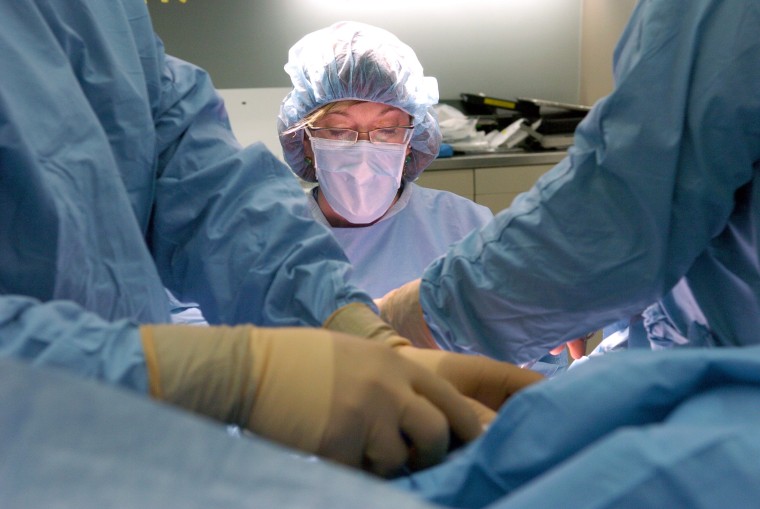On Thursday, a Colorado man was arrested for performing a back-alley surgery on a transgender woman the day before.
James Lowell Pennington was arrested on suspicion of first-degree assault after using an Army medical kit to remove the trans woman's testicles at her request. According to a police report, the surgery took approximately 90 minutes, but the patient's wife later called 911 to report "a large amount of blood" that came through the suture.

Police said Pennington operated without a medical license and confessed to performing the surgery.
On Sunday, though, the woman Pennington operated on issued a long public statement defending him— and blamed the botched procedure on "a society and healthcare system that focuses on trying to demonize transgender people."
"Arranging a back-alley surgery was out of pure desperation due to a system that failed me," said the transgender woman who identified herself only as Jane Doe. "Do not paint me as a victim of naivety or obsession and do not paint Mr. Pennington as a monster."
In the letter, the woman explained that despite being born with a male body, "my gender has been female since I developed any sort of gender identity." She said she has been on hormone replacement therapy since 2013 and repeatedly tried to get gender-confirmation surgery in the past.
"I tried for many years to go through legitimate routes to get these surgeries which would make my physical genitalia match my gender," Jane Doe said. "Yet every time something went wrong. Whether it be the loss of insurance, or changes in the law, I have been stopped at every single turn from completing my transition."
"Arranging a back-alley surgery was out of pure desperation due to a system that failed me. Do not paint me as a victim of naivety or obsession and do not paint Mr. Pennington as a monster."
Doe's letter and defense of the man who operated on her without a medical license raise questions around access to transgender-specific medical care.
According to the 2015 U.S. Transgender Survey, conducted by the National Center for Transgender Equality, 55 percent of people who sought insurance coverage for transition-related surgeries were denied. Twenty-five percent reported having their hormone therapy denied by insurers as well.
That was the experience of Emily Crose, a writer and security researcher who told NBC News that despite having a lucrative career, she has faced obstacles accessing gender-confirming health care.
"I'm pretty privileged, and I still have had problems," Crose said. She was surprised to discover that her insurance didn't cover transition-related surgeries, and that in many cases, insurers only offered the coverage through special gender-reassignment riders that employers have to "opt in" to — often paying unnecessary extra fees.
That means Crose, and people like her, would have to fork over the entire cost of surgery in cash.
"The base cost of a full orchiectomy (removal of testicles) and vaginoplasty is roughly $30,000," Crose said. "That's just for the surgery, but then there are also high costs for after-care."

Because there are a relatively small number of doctors known for performing gender-confirmation surgeries, the procedures usually involve travel.
"You can't just go get yourself a shiny new vagina and jump on an airplane home the next day," Crose said. "So you usually have a week-long hospital stay after, then most people will stay in a hotel locally."
To get the surgeries she seeks, Crose would have to pay entirely out-of-pocket; the final cost after travel and recovery could range anywhere from $40,000 to $60,000.
For transgender men, the costs can be even higher — and the procedures riskier.
"Phalloplasty is very expensive, around $60,000 to $80,000," said Jamison Green, former president of the World Professional Association for Transgender Health (WPATH) and a current board member. "Finances are one of the big reasons people don’t do it, but also it’s a very risky procedure, and there can be complications."
Green said most trans men opt to only have "top surgery," or chest reconstruction, as a result. But even when insurance appears to cover a procedure, he said, sometimes it's only partial coverage.
"There are cases in which trans men can have mastectomies but cannot have nipple grafting," Green said, explaining that patients are left to pay the difference when only part of a procedure is covered.
But shining light on insurance complications only reveals what some of the country's estimated 1.4 million transgender people struggle with. Many do not have health insurance at all.
The National Center for Transgender Equality's 2015 survey found that rates of unemployment were three times higher in the transgender community than the U.S. population at large. Many unemployed and under-employed people go without health insurance, or qualify for state low-income coverage programs like Medicaid and Medicare. Green said that only a handful of U.S. states have expanded Medicaid to include transition-related coverage, and Medicare policies are set regionally.
One of the few places WPATH is seeing an expansion in transgender health care is among Fortune 500 companies, where over half now offer transition coverage in their employee health plans.
"All of them will say that it didn’t cost them anything extra," Green said.
The Affordable Care Act (also known as Obamacare) included a nondiscrimination rule that would have mandated the majority of insurance companies cover all health care needed by transgender people — including hormone therapy and surgeries.
But early in May, the Trump administration's Health Department announced it would no longer defend Obamacare's nondiscrimination policy in court. In a court filing on May 2, the Health Department said it would "reconsider" two hotly contested mandates in the Affordable Care Act: the right of women to seek birth control and abortion, and the right of transgender people to access transition-related care.